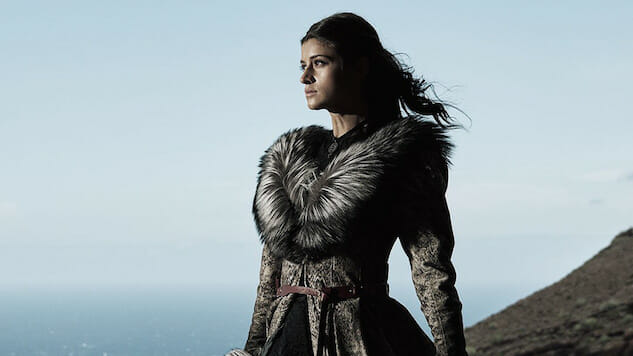The Complicated Women of The Witcher Are Exactly What the Fantasy Genre Needs
Photo Courtesy of Netflix
Netflix’s The Witcher is a memorable watch for many reasons: Geralt of Rivia’s dry, dispassionate line delivery and dedicated love of baths; the bard Jaskier and his absolute banger of a ballad dedicated to his monster-hunting muse; exciting fight sequences; and a freakishly complex timeline that’s as frustrating as it is fun to unravel. But what makes the series really stand out in the current landscape of fantasy television is that while it’s ostensibly a story about the titular stoic bounty hunter, it features some of the most complex, flawed, and all-around great female characters in genre right now.
This is shocking in and of itself because, on paper, The Witcher seems like exactly the sort of show that should be vaguely misogynist at best and grossly sexist at worst. The pseudo-medieval setting full of monsters and hulking warriors seems tailor-made for the inclusion of such common fantasy tropes as damsels in distress, sassy sex workers, and pointless, objectifying nudity of the variety used so frequently on Game of Thrones. (Never forget Petyr Baelish’s Brothels of Exposition, folks!)
How many women on shows like this barely get full names, let alone things like character development or arcs of their own?
Yet, The Witcher not only gives its female characters the sort of depth and agency that most fantasy series never even attempt, it also makes the deliberate choice to tell stories about women from a wide variety of backgrounds, classes, and abilities, and consistently goes to the mat (narratively speaking) for their right to choose their own destinies
The women of The Witcher aren’t perfect—the show’s depiction of intersectional issues like race and disability, as well as its clunky ideas about the power of motherhood could use some work as it heads into Season 2. But unlike so many other fantasy series, these female characters aren’t here to serve men’s stories, or to allow men to tell theirs. Instead, The Witcher’s women are presented as everything that men are—and have always been—in genre stories: Heroes, villains, and everything in between.
The Witcher follows the stories of over a half a dozen strong, capable women during the course of its eight-episode first season, and each is compelling, captivating and often awful in her own unique way. One of the best things about the world of this show is that there’s no one specific way to be a woman in it, which means we see everything from hardened female warriors to icy monarchs, trauma survivors and girly girls discovering their own strength. These characters all occupy complex moral spaces, where they each possess their own agendas, have their own flaws and make their own mistakes. Their motivations and goals are both noble and selfish, often at the same time. These women are, in short, fully realized characters—just as Geralt and the rest of the men in the series are.
Battle-hardened queen Calanthe styles herself as the Lioness of Cintra and loves the brutality of bloodshed, not simply for its own sake but because it serves as the great equalizer in the heavily patriarchal society in which she lives. She loves her family and puts the good of her kingdom above everything else. Yet, she is hardly a role model. Though she is an admirable leader, Calanthe is also a liar and a bully, and for all her great battle victories, her hubris is what ultimately dooms Cintra to destruction. (Not to mention the fact that she commits something awfully close to genocide against the neighboring elves.)
Her daughter Pavetta chooses a different path, making decisions based on her heart rather than her head. She desires the life of love, commitment and stability her mother has always rejected, even if that means marrying a guy who happens to have been turned into a hedgehog and keeping a secret that ultimately sees her daughter become a Child of Surprise. The talented female mages of Aretuza run the gamut from sweetly noble to selfishly manipulative, but their leader Tissaia de Vries’s rule is based on a combination of snarky cruelty, frosty care, and a constant willingness to sacrifice any one of her “girls” for what she sees as the greater good.
-

-

-

-

-

-

-

-

-

-

-

-

-

-

-

-

-

-

-

-

-

-

-

-

-

-

-

-

-

-

-

-

-

-

-

-

-

-

-

-








































